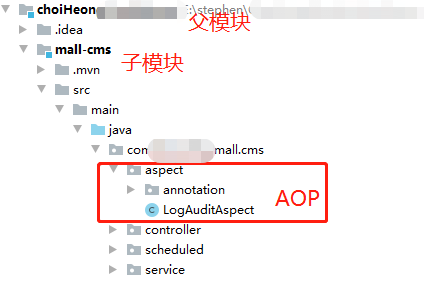SpringBoot配置使用Spring AOP日志记录
1、引入pom
<!--springBoot的aop--> <dependency> <groupId>org.springframework.boot</groupId> <artifactId>spring-boot-starter-aop</artifactId> </dependency> <!--日志打印使用到 @Slf4j注解 方便又简单--> <dependency> <groupId>org.projectlombok</groupId> <artifactId>lombok</artifactId> </dependency>
关于@Slf4j IDEA无法显示import的问题
https://www.cnblogs.com/dzcici/p/12877551.html
目录结构

2、使用注解方式进行注明

LogAuditAspect.class
package com.dbcoding.mall.cms.aspect; import com.dbcoding.mall.cms.aspect.annotation.SystemLogs; import com.dbcoding.mall.cms.service.SellChannelAddressService; import com.dbcoding.mall.utils.RequestUtil; import lombok.extern.slf4j.Slf4j; import org.apache.logging.log4j.util.PropertiesUtil; import org.aspectj.lang.JoinPoint; import org.aspectj.lang.annotation.After; import org.aspectj.lang.annotation.AfterThrowing; import org.aspectj.lang.annotation.Aspect; import org.aspectj.lang.annotation.Pointcut; import org.springframework.beans.factory.annotation.Autowired; import org.springframework.stereotype.Component; import org.springframework.web.context.request.RequestContextHolder; import org.springframework.web.context.request.ServletRequestAttributes; import javax.servlet.http.HttpServletRequest; import java.lang.reflect.Method; import java.util.HashMap; import java.util.Map; /** * @ClassName: AAA * @Description: TODO * @Author: Stephen.Zhang * @CreateDate: 2020-05-15 09:37 * @Version: 1.0 **/ @Aspect @Component @Slf4j public class LogAuditAspect { private String LOG_AUDIT_MESSAGE = "log_audit.properties"; @Autowired private SellChannelAddressService sellService; @Pointcut("@annotation(com.dbcoding.mall.cms.aspect.annotation.SystemLogs)") public void aspect() { } @After("aspect()") public void doAfter(JoinPoint joinPoint) throws Exception { HttpServletRequest request = ((ServletRequestAttributes) RequestContextHolder.getRequestAttributes()) .getRequest(); Map<String, Object> map = getControllerMethodDescription(joinPoint); String key = (String) map.get("key"); //String description = PropertiesUtil.getProperties(this.LOG_AUDIT_MESSAGE, key); log.info(key);//方法名备注 log.info(RequestUtil.getRealIp(request));//IP log.info(request.getRequestURI());//请求具体URL log.info(request.getMethod());//请求方法 GET... } @AfterThrowing(pointcut = "aspect()", throwing = "e") public void doAfterThrowing(JoinPoint joinPoint, Throwable e) { log.info("Enter the abnormal log..."); try { HttpServletRequest request = ((ServletRequestAttributes) RequestContextHolder.getRequestAttributes()) .getRequest(); Map<String, Object> map = getControllerMethodDescription(joinPoint); String key = (String) map.get("key"); //String description = PropertiesUtil.getProperties(this.LOG_AUDIT_MESSAGE, key); log.info(key);//注解value值 log.info(RequestUtil.getRealIp(request));//IP log.info(request.getRequestURI());//请求具体URL log.info(request.getMethod());//请求方法 GET... log.info(e.getMessage());//异常消息 } catch (Exception e1) { e1.printStackTrace(); } } private Map<String, Object> getControllerMethodDescription(JoinPoint joinPoint) throws Exception { Map<String, Object> map = new HashMap(); String targetName = joinPoint.getTarget().getClass().getName(); String methodName = joinPoint.getSignature().getName(); Object[] arguments = joinPoint.getArgs(); Class targetClass = Class.forName(targetName); Method[] methods = targetClass.getMethods(); for (Method method : methods) { if (method.getName().equals(methodName)) { Class[] clazzs = method.getParameterTypes(); if (clazzs.length == arguments.length) { map.put("key", ((SystemLogs) method.getAnnotation(SystemLogs.class)).key()); break; } } } return map; } }
SystemLogs
package com.dbcoding.mall.cms.aspect.annotation; import java.lang.annotation.Documented; import java.lang.annotation.Retention; import java.lang.annotation.RetentionPolicy; import java.lang.annotation.Target; @Documented @Retention(RetentionPolicy.RUNTIME) @Target({java.lang.annotation.ElementType.PARAMETER, java.lang.annotation.ElementType.METHOD}) public @interface SystemLogs { String key() default ""; }
RequestUtil.class
package com.dbcoding.mall.utils; import lombok.extern.slf4j.Slf4j; import org.apache.commons.lang3.StringUtils; import org.apache.commons.lang3.math.NumberUtils; import javax.servlet.http.HttpServletRequest; import java.util.Enumeration; import java.util.regex.Matcher; /** * @ClassName: AAA * @Description: TODO * @Author: Stephen.Zhang * @CreateDate: 2020-05-15 10:18 * @Version: 1.0 **/ @Slf4j public class RequestUtil { public static int getPageid(HttpServletRequest request, String name) { int pageid = NumberUtils.toInt(request.getParameter(name)); if (pageid <= 0) { return 1; } return pageid; } public static String getUrl(HttpServletRequest request) { StringBuffer sb = request.getRequestURL(); String queryString = request.getQueryString(); if (StringUtils.isNotEmpty(queryString)) { sb.append('?').append(queryString); } return sb.toString(); } public static String getReferer(HttpServletRequest request) { return request.getHeader("referer"); } public static String getRequestUri(HttpServletRequest request) { return request.getRequestURI(); } private static final java.util.regex.Pattern IS_LICIT_IP_PATTERN = java.util.regex.Pattern.compile("^[0-9]{1,3}\\.[0-9]{1,3}\\.[0-9]{1,3}\\.[0-9]{1,3}$"); public static boolean isLicitIp(final String ip) { if (StringUtils.isEmpty(ip)) { return false; } Matcher m = IS_LICIT_IP_PATTERN.matcher(ip); if (!m.find()) { return false; } return true; } public static boolean isSsl(HttpServletRequest request) { boolean isSsl = "true".equalsIgnoreCase(request.getHeader("ssl")); return isSsl; } public static String getProtocol(HttpServletRequest request) { boolean isSsl = RequestUtil.isSsl(request); String protocol; if (isSsl) { protocol = "https"; } else { protocol = "http"; } return protocol; } public static String getRedirect(HttpServletRequest request, String url) { if (StringUtils.isEmpty(url)) { log.error("url parameters can not be null."); throw new NullPointerException("url parameters can not be null."); } if (url.startsWith("http")) { return url; } boolean isSsl = RequestUtil.isSsl(request); if (!isSsl) { return url; } if (!url.startsWith("/")) { String path = request.getServletPath(); int index = path.lastIndexOf('/'); if (index != -1) { url = path.substring(0, index + 1) + url; } } String serverName = request.getServerName(); return "https://" + serverName + url; } @SuppressWarnings("unchecked") public static void printHeaders(HttpServletRequest request) { Enumeration<String> e = request.getHeaderNames(); while (e.hasMoreElements()) { String name = e.nextElement(); String value = request.getHeader(name); log.info(name + ":" + value); } } /** * 获取真实客户端IP * * @param request * @return */ public static String getRealIp(HttpServletRequest request) { String ip = request.getHeader("X-Forwarded-For"); if (ip == null || ip.length() == 0 || "unknown".equalsIgnoreCase(ip)) { ip = request.getHeader("Proxy-Client-IP"); } if (ip == null || ip.length() == 0 || "unknown".equalsIgnoreCase(ip)) { ip = request.getHeader("WL-Proxy-Client-IP"); } if (ip == null || ip.length() == 0 || "unknown".equalsIgnoreCase(ip)) { ip = request.getRemoteAddr(); } int index = ip.lastIndexOf(','); if(index <= 0) { index = ip.length(); } String lastip = ip.substring(0, index).trim(); if ("127.0.0.1".equals(lastip) || !isLicitIp(lastip)) { return request.getRemoteAddr(); } return lastip; } }
3、使用


不忘初心




